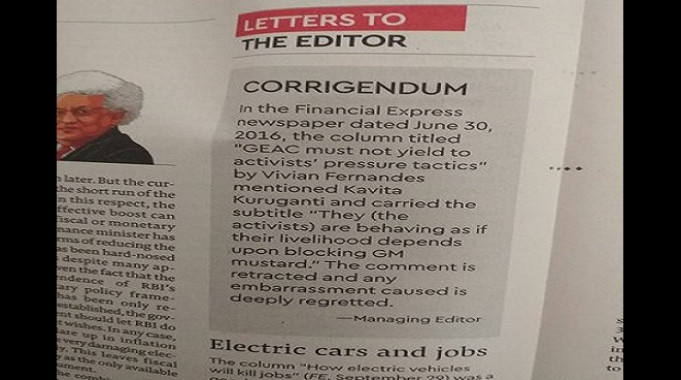GM food issue: PCI orders retraction
Activism has always been contentious for governments, which is not surprising as it questions the decisions taken for citizens by the people in power. But it is recognized that the voices of dissent by activists contribute to keeping democracy alive and are critical for good and informed decision-making. The media plays an important role in this dialogue between the powerful, not-so powerful and the powerless by facilitating debates and opinions that further strengthen the democratic fabric of a country.
To be fair, every player in this dance of democracy should be held accountable, as their words and actions have consequences. Unfortunately, accountability is rare in a complex country like ours but the stories that inspire accountability and responsibility deserve to be narrated.
On 30 June 2016, the Financial Express published a piece by columnist Vivian Fernandes on the debate unfolding around the commercial approval of Genetically Modified (GM) mustard. The debate is not new, nor limited to India. While proponents claim yield increases, opponents have produced evidence to the contrary. There are also issues around the health and environmental impact.
In his article titled “GEAC must not yield to pressure tactics by activists”, Fernandes mentioned activist Kavitha Kuruganti, saying “the activists are behaving as if their livelihood depends upon blocking GM Mustard” and “Perhaps it does. It’s time to put them out of business.”
Fernandes is entitled to his opinion but he not an impartial commentator. At the time that he wrote the column, he was, and still is, consulting editor for a website called smartindianagriculture.in. The website says “We are supported by the Association of Biotech-led Enterprises - Agriculture Focus Group (ABLE-AG) - but have a voice of our own.” Today that sentence is missing from the ‘About Us’ page of the site.
To put things in perspective, Kavitha Kuruganti is the National Convenor of the Alliance for Sustainable and Holistic Agriculture and is also founder member of an initiative that focuses on the rights of women farmers called MAKAAM (Mahila Kisan Adhikaar Manch).
Kuruganti and others have been relentlessly fighting for the welfare of farmers and farming, with not a penny to be gained, rather lost, for the cause. She does not hold a job or earn a salary. A personal and derogatory attack by Fernandes demeans the decades of work that many activists like Kuruganti have done - not for profit or even livelihood, but for the public good.
On July 25, 2016 Kuruganti filed a complaint with the Press Council of India (PCI) on the statement made by Fernandes against her and other activists, after not getting a response from the editor of the Financial Express. While the editor of the newspaper retracted the derogatory line from the online version months after the first complaint was filed with the PCI, nothing was done with the print version.
The fundamental point was ignored, namely, that Fernandes had been allowed to vilify citizens who are worried about the safety of their foods and farms while, ironically, getting paid himself for sponsored content by the biotech industry.
Kuruganti said in her complaint that Fernandes was being funded by a biotech industry body called ABLE, and was heading Cursor Editorial Services. To which the editor of the Financial Express had responded that Fernandes was not funded by ABLE, but “is given some ‘sponsored content’ for which they will pay him.”
This is not just a matter of the columnist’s irresponsible writing but also about the lack of editorial responsibility in having checks and balances on the content that is mass-produced by the newspaper. The PCI recognized this as well and in a hearing that took place in September 2017, instructed the Financial Express to publish a corrigendum which was agreed between them and Kuruganti.
I would further like to add, since I was part of this hearing, that it was a refreshing change in the current political climate to see an institutional body like the PCI perform its function diligently, take the side of what is right, and uphold the principle that a personal attack on an activist is unwarranted.
I think for all of us in this struggle against keeping Genetically Modified Organisms out of our food and farms, the corrigendum released by the Financial Express on October 2, 2017 was a welcome step. In it, the managing editor confirms that the objectionable line has been retracted and that any embarrassment caused by it is deeply regretted.
This order by the PCI should give activists the confidence to challenge any story or column that attacks us personally simply because we have an opinion which is different from that of the establishment and the mainstream media.
For the movement against GM crops in India, this sends a message to all who seek to distract the focus from open, scientific and logical dialogue into personal attacks. It also makes one more thing quite clear: that the media faces who you think are taking a balanced view could be tangled in a web of ideology and vested interest.
Neha Saigal is a member, Coalition for a GM Free India.







